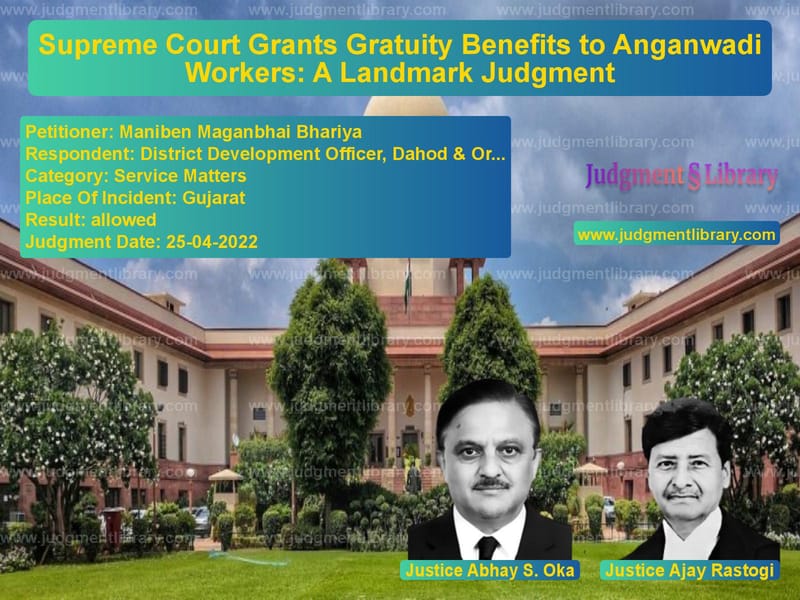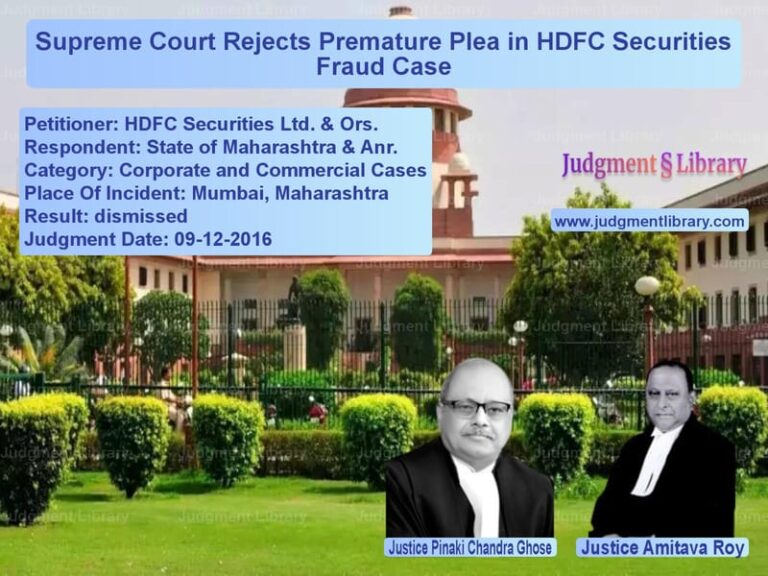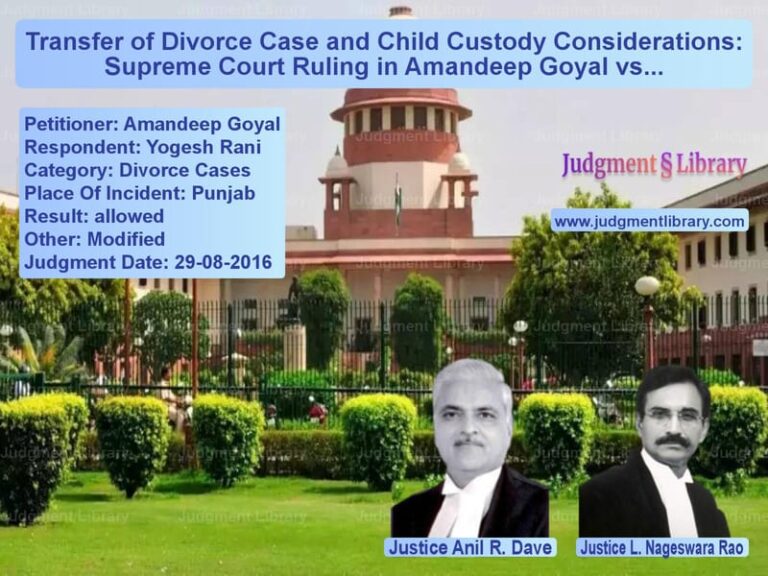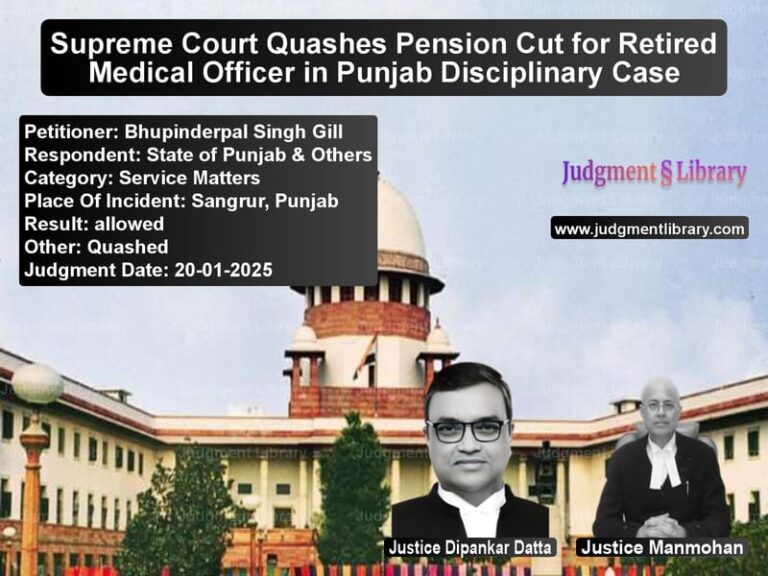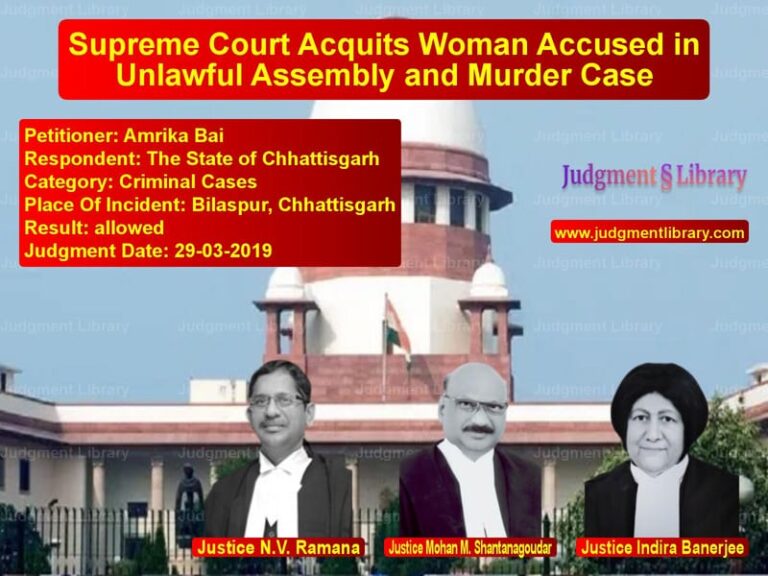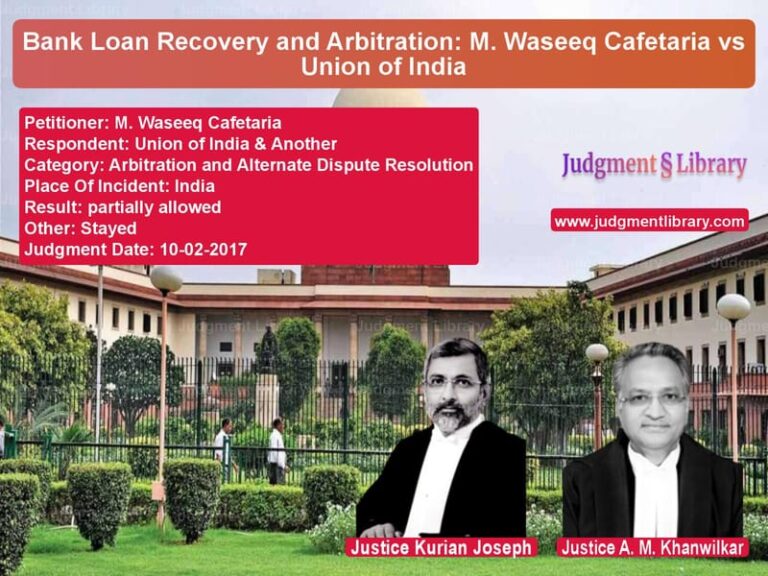Supreme Court Grants Gratuity Benefits to Anganwadi Workers: A Landmark Judgment
The Supreme Court of India recently delivered a landmark judgment in the case of Maniben Maganbhai Bhariya v. District Development Officer, Dahod & Ors., holding that Anganwadi workers and helpers are entitled to gratuity benefits under the Payment of Gratuity Act, 1972. This ruling overrules the decision of the Gujarat High Court, which had previously denied their claims. The judgment has significant implications for the employment rights of over 1.3 million Anganwadi workers across India, ensuring social security and financial stability upon retirement.
Background of the Case
The appellants in this case were employed as Anganwadi workers and Anganwadi helpers under the Integrated Child Development Services (ICDS) Scheme. Their primary duties included providing nutritional support, pre-school education, and health care to children and mothers in rural and urban slum areas. Having served for over 20 years, they approached the authorities seeking gratuity benefits upon retirement. Initially, the prescribed authority ruled in their favor, recognizing their entitlement under the Payment of Gratuity Act, 1972. The appellate authority upheld this decision.
However, the Gujarat High Court overturned this ruling, stating that Anganwadi workers are not government employees but rather honorarium-based voluntary workers and, therefore, not covered under the Gratuity Act. This led the workers to file an appeal before the Supreme Court.
Key Legal Issues
- Whether Anganwadi workers and helpers qualify as employees under the Payment of Gratuity Act, 1972.
- Whether the honorarium received by them constitutes ‘wages’ under the Act.
- Whether ICDS centers can be classified as an ‘establishment’ under the Act.
Arguments by the Petitioner (Anganwadi Workers)
The petitioners contended that Anganwadi workers perform crucial public functions and should be entitled to gratuity like other workers. Their primary arguments were:
- Anganwadi centers fall under the definition of ‘establishment’ as per the Gratuity Act.
- The honorarium received by them qualifies as ‘wages’ under the Act.
- They serve under a structured employment framework, performing defined duties under government guidelines.
- The non-payment of gratuity violates their fundamental rights to equal pay and fair conditions of work.
Arguments by the Respondent (State of Gujarat and Central Government)
The government opposed the claims, arguing that:
- Anganwadi workers are not government employees but honorary workers.
- The remuneration they receive is not a salary but an honorarium.
- ICDS is a welfare scheme rather than an industrial or commercial establishment.
- The government is not bound to pay gratuity to workers engaged in social service programs.
Supreme Court’s Observations
1. Anganwadi Centers as an Establishment
The Supreme Court observed that Anganwadi centers function under the administrative control of state governments, implementing central government schemes. Justice Abhay S. Oka noted:
“Anganwadi centers perform a statutory function under the National Food Security Act, 2013. The definition of ‘establishment’ under the Gratuity Act includes such centers, making workers eligible for benefits.”
2. Honorarium as Wages
The Court rejected the argument that the honorarium received by Anganwadi workers does not constitute wages. It held:
“The financial compensation provided to Anganwadi workers is directly linked to their performance of statutory duties. The honorarium meets the definition of wages.”
3. Applicability of the Payment of Gratuity Act
The Court referred to previous cases where workers engaged in similar employment structures were granted gratuity benefits, reinforcing its decision:
- In Bharat Sanchar Nigam Ltd. v. Bhurumal, the Court held that gratuity is a statutory right.
- In Dharwad District PWD Literate Daily Wage Employees’ Association v. State of Karnataka, the Court ruled that social welfare workers deserve employment benefits.
Judgment
- The Supreme Court set aside the Gujarat High Court ruling.
- It restored the decision of the prescribed authority, directing the Gujarat Government to pay gratuity.
- It ordered the payment of gratuity with 10% simple interest per annum to all eligible Anganwadi workers and helpers.
Implications of the Judgment
- Recognizes Anganwadi workers as formal employees eligible for gratuity.
- Sets a precedent for social security benefits in welfare employment schemes.
- Strengthens the labor rights of over 1.3 million Anganwadi workers in India.
Conclusion
This Supreme Court ruling marks a significant victory for Anganwadi workers, ensuring them financial security upon retirement. It underscores the importance of recognizing the contributions of workers engaged in government-sponsored welfare schemes and upholding their rights under labor laws.
Petitioner Name: Maniben Maganbhai Bhariya.Respondent Name: District Development Officer, Dahod & Ors..Judgment By: Justice Abhay S. Oka, Justice Ajay Rastogi.Place Of Incident: Gujarat.Judgment Date: 25-04-2022.
Don’t miss out on the full details! Download the complete judgment in PDF format below and gain valuable insights instantly!
Download Judgment: maniben-maganbhai-bh-vs-district-development-supreme-court-of-india-judgment-dated-25-04-2022.pdf
Directly Download Judgment: Directly download this Judgment
See all petitions in Employment Disputes
See all petitions in Public Sector Employees
See all petitions in Pension and Gratuity
See all petitions in Judgment by Abhay S. Oka
See all petitions in Judgment by Ajay Rastogi
See all petitions in allowed
See all petitions in supreme court of India judgments April 2022
See all petitions in 2022 judgments
See all posts in Service Matters Category
See all allowed petitions in Service Matters Category
See all Dismissed petitions in Service Matters Category
See all partially allowed petitions in Service Matters Category

